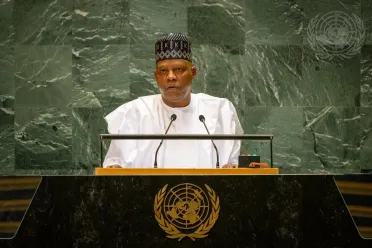Statement
Statement summary
KASHIM SHETTIMA, Vice-President of Nigeria, noted his country recently celebrated a quarter century of unbroken democratic rule. However, the return of unconstitutional changes of Government and forceful military takeovers in some countries of the Sahel underscore the fragility of democracy when it is not backed by economic development and sustained peace and security. It is the duty of the international community to bring back confidence in democratic rule, as “we need the substance of democracy, not just the form”, he said. He warned that violent extremism remains an existential threat to both national and international peace, security and development, pointing to the High-Level African Counter-Terrorism Meeting hosted by Nigeria in April 2024 and “The Abuja Declaration” — a promise to provide solutions to the challenges presented by terrorists and insurgents. “Conflict prevention is the main reason why the UN exists,” he stressed, and addressing the root causes of conflicts is often the first step towards providing long-term solutions.
Turning to “the heart-wrenching situation in Gaza and other Palestinian territories,” he affirmed that the Palestinian people deserve their independence, requiring the two-State solution. He reaffirmed commitment to supporting UN peacekeeping operations, recognizing the need for Africa to build strong and professional armies. Consequently, he reiterated the call for international support to operationalize the African Standby Force. Welcoming the change in tone on Security Council reform, he stressed: “Our continent deserves a place in the permanent members category.” As most developing countries are significantly behind in the achievement of the SDGs, he expected that the Pact for the Future will reposition economies and translate into concrete measures — particularly significant in his region and the Sahel, where human development indices are low and depressing.
Reiterating the call for reform of international financial architecture, he emphasized that proceeds of corruption and illicit financial flows constitute a huge chunk of resources needed for sustainable development. The recovery and return of such funds to States of origin is a fundamental principle of the United Nations Convention against Corruption. Further, there is an urgent need to promote fair and inclusive global tax regimes and work towards a UN framework convention on tax cooperation. Countries of the Global South cannot make meaningful economic progress without special concessions and a review of their current debt burden. Meanwhile, as the world transitions into the fourth industrial revolution, his Government believes that natural gas remains central to the search for solutions to Africa’s energy challenges.
On climate action, it is Nigeria’s expectation that the upcoming twenty-ninth session of the Conference of the Parties to the United Nations Framework Convention on Climate Change (COP29) in Azerbaijan will provide developing countries — especially African countries — access to loss and damage funds, including the $100 billion pledged by developed countries. With the evolution of artificial intelligence, the UN should work towards eliminating barriers to digital economy in Africa, such as high costs of Internet services and intellectual property rights. Nigeria’s experience, he noted is that “new technologies, when not properly regulated, can facilitate organized crime, violent extremism and human trafficking. On migration, he emphasized that Nigeria is a country of origin, transit and destination, reiterating support for the Global Compact for Safe, Orderly and Regular Migration.
Full statement
Read the full statement, in PDF format.
Photo

Previous sessions
Access the statements from previous sessions.
